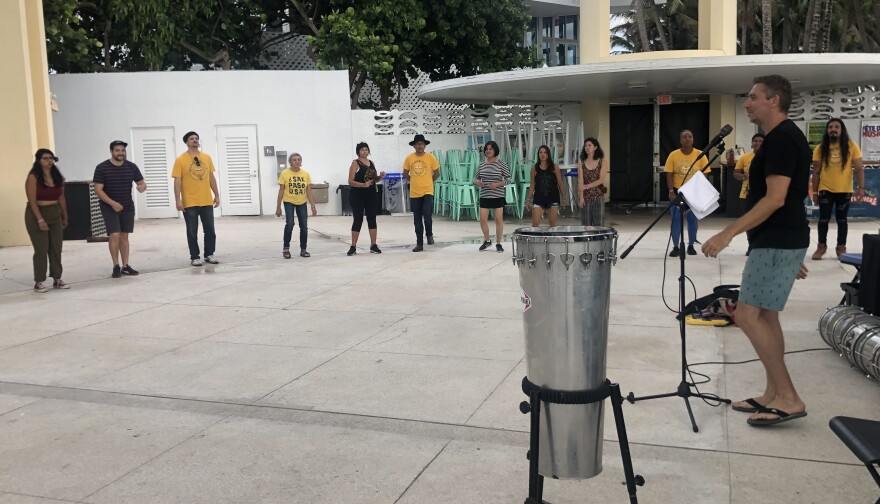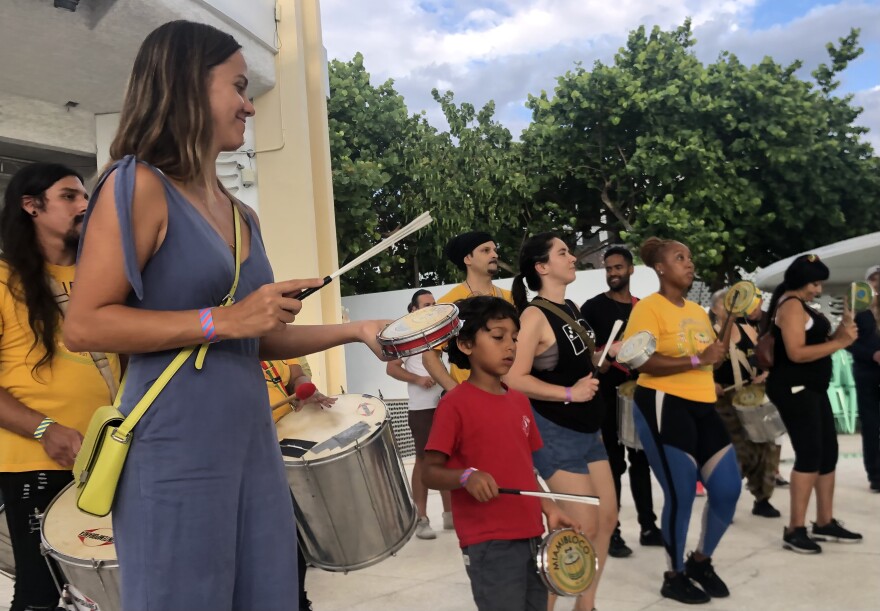After months of pandemic isolation, a lot of people in South Florida have been looking for an outlet. For some, getting together to bang on some drums was what they needed. Since COVID, amateur musicians have been flocking to Brazilian percussion classes put on by the organization Miamibloco — to learn how to play and to build a community around samba.
As the pandemic continues, you can rely on WLRN to keep you current on local news and information. Your support is what keeps WLRN strong. Please become a member today. Donate now. Thank you.
“We are a small community oriented group, that's really a teaching ensemble, where you don't need to have any prior experience in playing music at all, or playing any Brazilian percussion,” said Brian Potts, director and founder of Miamibloco.
Potts got his doctorate in music at the University of Miami, where he studied under Ney Rosauro, a Brazilian percussionist and composer.
Rosauro inspired Potts to travel to Brazil, where he was blown away by the blocos of Rio de Janeiro — the boisterous street bands that take over the city during Carnaval.
“People who are from all different parts of Rio and different backgrounds, classes, different races, different everything. Music brings them all together. Samba brings them all together,” Potts said.

Miamibloco started out as a bunch of professional musician friends playing gigs around town and jamming in backyards.
“We would do classes around town at the parks,” said Potts. “And then the world changed. The pandemic happened. Everything shut down. I realized that I missed this terribly.”
Once it felt safe last summer Miamibloco got the drums back out. "We started doing workshops again and it really blew up at that point,” he said.
Since the pandemic, Potts has worked to refocus the group on teaching and bringing people together who have never before played the drums.
“[Blocos] are community building technology, ancient community building technology that still works to this day and holds that community down there together,” Potts said. “And frankly, we need it here.”

On a recent Monday evening, about 40 drummers were milling around at the North Beach Bandshell for a Miamibloco workshop. For some, it was their very first class. Others have been coming for months and caught up over sips of colada.
“The way we start every Miamibloco rehearsal is by singing and learning the parts vocally first,” Potts told the group.
“So if you’re new here, you’re going to get ridiculous with us and we’re all going to have a good time together, ok? So here we go. Sing after me,” he told them.
Potts began scatting samba rhythms, leading the group in a call and response as they marched to keep time.
“That's the magic of Miamibloco, to begin with, you know? To be able to dissipate that barrier between who's professional, who's not professional, as long as you really follow the rhythm, right?” said SuOm Francis, the group’s community outreach artist and social media manager.
Like many, she was a little intimidated when she came to her first workshop. But she says the accessibility of the teaching style and the joy of playing together won her over.
Potts said Francis, who is also his girlfriend, has been a driving force in expanding and promoting the group – and drilling down on its mission of bringing people together around samba.

“We have people that are 70 years old, six years old, 17 years old and everything in between,” Francis said. “I've been focusing more on that aspect of community building and how…you don't have to be great to begin with, but you are important in the group.”
Potts splits the players into sections like an orchestra and walks them through the different rhythms for each instrument, as they chant and tap their feet to the beat. He brings in one section at a time, layering their voices like a human drum machine.
“So we have surdos over here, which are the big boys. We have the repiques, which is kind of like the lead drum, you'll see me play that a lot,” he said. “The caxias over here, which are like a snare drum. And then we have over here, the tamborim and the ganzá and the agogô. And those are a lot of our high pitch frequencies that give us some of the melody.”
Once the group has a solid feel for the rhythms, he hands out the instruments and gets the players into formation.

“If you have a caixa, go to the left. If you have a repique, go to the right,” he said. “Let’s start with the caixas.”
Potts calls out one section at a time and they start building the groove. The music reverberates through the bandshell and carries out onto the street, where neighbors walking by are drawn in to listen.
For Clara Andrade, playing with Miamibloco transports her home.
“It was like I was back in Brazil for a little bit, like for a few hours,” she said.
Now she gets to share that feeling with her son Luca. They’ve been picking up the tamborim.
Petra Cleary was pulled into Miamibloco through her love of dancing samba. Born in Jamaica, she says she’s drawn to the music and dance of the African diaspora.
“What’s important to me is to get a better understanding and a broader understanding and to embody that and grow that for myself,” Cleary said. “To get more connected and grounded to that ancestral lineage and really just to be able to share it.”
Maria Llorca found the group earlier this year, when she felt safe going to in-person events again. She’s always loved music but struggled to find classes that weren’t just for kids.
“It's almost like, either you learned an instrument by the time you got to the end of high school or college or you missed the boat,” she said, “and it shouldn't be.”
After months of pandemic isolation and disruption, Llorca says there’s a kind of magic in playing together.

“It is just…it's joy,” she said. “And to be together with other people and create a sound that is impossible to create by yourself but is only possible by the sounds and the silence between the sounds that a community can create. That's amazing.”
For Potts, Miamibloco isn’t just about samba. It’s about building a community of people who might never meet otherwise – and helping them find their rhythm together.
“Every time afterwards, the first thing I hear is, ‘thank you, I needed this’,” Potts said. “Going back to the pandemic stuff, this is kind of a nice way for me and I think everybody else who has been participating to re-enter into that and get to share this kind of space together again.”
Miamibloco’s final performance of the season is on Memorial Day at the North Beach Bandshell at 6 pm. More information about the group and how to get tickets is available here.
Editor's Note: a previous version of this story misidentified one of the instruments being played. It is a caixa, not a cuica.



